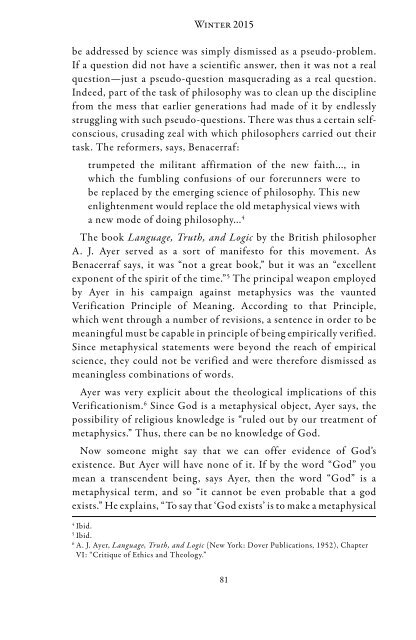THE CITY
h6c7p5d
h6c7p5d
Create successful ePaper yourself
Turn your PDF publications into a flip-book with our unique Google optimized e-Paper software.
Winter 2015<br />
be addressed by science was simply dismissed as a pseudo-problem.<br />
If a question did not have a scientific answer, then it was not a real<br />
question—just a pseudo-question masquerading as a real question.<br />
Indeed, part of the task of philosophy was to clean up the discipline<br />
from the mess that earlier generations had made of it by endlessly<br />
struggling with such pseudo-questions. There was thus a certain selfconscious,<br />
crusading zeal with which philosophers carried out their<br />
task. The reformers, says, Benacerraf:<br />
trumpeted the militant affirmation of the new faith..., in<br />
which the fumbling confusions of our forerunners were to<br />
be replaced by the emerging science of philosophy. This new<br />
enlightenment would replace the old metaphysical views with<br />
a new mode of doing philosophy... 4<br />
The book Language, Truth, and Logic by the British philosopher<br />
A. J. Ayer served as a sort of manifesto for this movement. As<br />
Benacerraf says, it was “not a great book,” but it was an “excellent<br />
exponent of the spirit of the time.” 5 The principal weapon employed<br />
by Ayer in his campaign against metaphysics was the vaunted<br />
Verification Principle of Meaning. According to that Principle,<br />
which went through a number of revisions, a sentence in order to be<br />
meaningful must be capable in principle of being empirically verified.<br />
Since metaphysical statements were beyond the reach of empirical<br />
science, they could not be verified and were therefore dismissed as<br />
meaningless combinations of words.<br />
Ayer was very explicit about the theological implications of this<br />
Verificationism. 6 Since God is a metaphysical object, Ayer says, the<br />
possibility of religious knowledge is “ruled out by our treatment of<br />
metaphysics.” Thus, there can be no knowledge of God.<br />
Now someone might say that we can offer evidence of God’s<br />
existence. But Ayer will have none of it. If by the word “God” you<br />
mean a transcendent being, says Ayer, then the word “God” is a<br />
metaphysical term, and so “it cannot be even probable that a god<br />
exists.” He explains, “To say that ‘God exists’ is to make a metaphysical<br />
4<br />
Ibid.<br />
5<br />
Ibid.<br />
6<br />
A. J. Ayer, Language, Truth, and Logic (New York: Dover Publications, 1952), Chapter<br />
VI: “Critique of Ethics and Theology.”<br />
81


